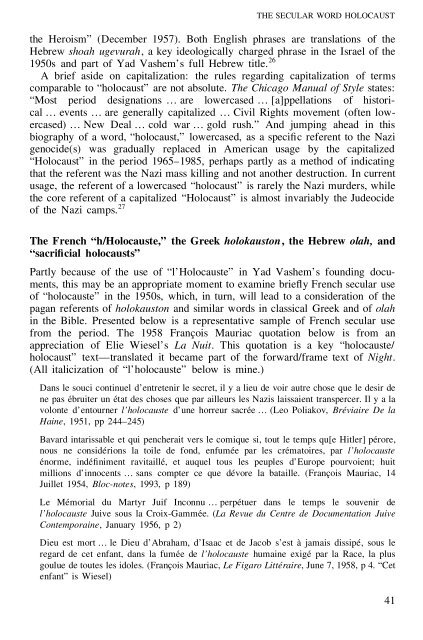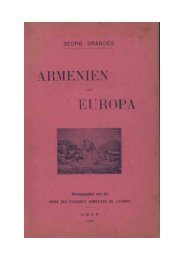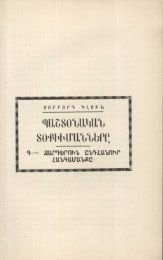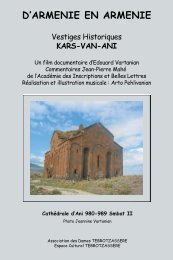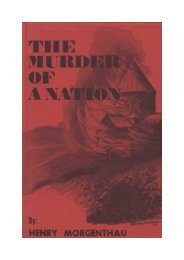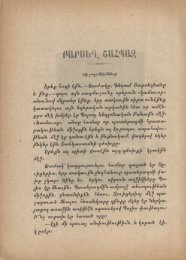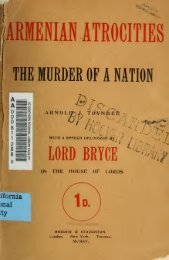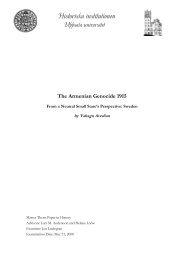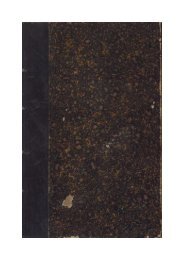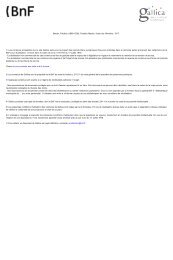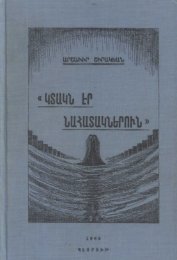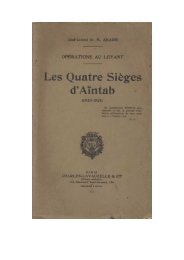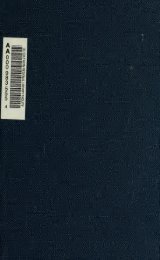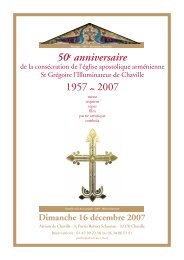The secular word HOLOCAUST: scholarly myths, history, and 20th ...
The secular word HOLOCAUST: scholarly myths, history, and 20th ...
The secular word HOLOCAUST: scholarly myths, history, and 20th ...
Create successful ePaper yourself
Turn your PDF publications into a flip-book with our unique Google optimized e-Paper software.
THE SECULAR WORD <strong>HOLOCAUST</strong>the Heroism” (December 1957). Both English phrases are translations of theHebrew shoah ugevurah, a key ideologically charged phrase in the Israel of the1950s <strong>and</strong> part of Yad Vashem’s full Hebrew title. 26A brief aside on capitalization: the rules regarding capitalization of termscomparable to “holocaust” are not absolute. <strong>The</strong> Chicago Manual of Style states:“Most period designations … are lowercased … [a]ppellations of historical… events … are generally capitalized … Civil Rights movement (often lowercased)… New Deal … cold war … gold rush.” And jumping ahead in thisbiography of a <strong>word</strong>, “holocaust,” lowercased, as a speci c referent to the Nazigenocide(s) was gradually replaced in American usage by the capitalized“Holocaust” in the period 1965–1985, perhaps partly as a method of indicatingthat the referent was the Nazi mass killing <strong>and</strong> not another destruction. In currentusage, the referent of a lowercased “holocaust” is rarely the Nazi murders, whilethe core referent of a capitalized “Holocaust” is almost invariably the Judeocideof the Nazi camps. 27<strong>The</strong> French “h/Holocauste,” the Greek holokauston, the Hebrew olah, <strong>and</strong>“sacri cial holocausts”Partly because of the use of “l’Holocauste” in Yad Vashem’s founding documents,this may be an appropriate moment to examine brie y French <strong>secular</strong> useof “holocauste” in the 1950s, which, in turn, will lead to a consideration of thepagan referents of holokauston <strong>and</strong> similar <strong>word</strong>s in classical Greek <strong>and</strong> of olahin the Bible. Presented below is a representative sample of French <strong>secular</strong> usefrom the period. <strong>The</strong> 1958 François Mauriac quotation below is from anappreciation of Elie Wiesel’s La Nuit. This quotation is a key “holocauste/holocaust” text—translated it became part of the forward/frame text of Night.(All italicization of “l’holocauste” below is mine.)Dans le souci continuel d’entretenir le secret, il y a lieu de voir autre chose que le desir dene pas ébruiter un état des choses que par ailleurs les Nazis laissaient transpercer. Il y a lavolonte d’entourner l’holocauste d’une horreur sacrée … (Leo Poliakov, Bréviaire De laHaine, 1951, pp 244–245)Bavard intarissable et qui pencherait vers le comique si, tout le temps qu[e Hitler] pérore,nous ne considérions la toile de fond, enfumée par les crématoires, par l’holocausteénorme, indé niment ravitaillé, et auquel tous les peuples d’Europe pourvoient; huitmillions d’innocents … sans compter ce que dévore la bataille. (François Mauriac, 14Juillet 1954, Bloc-notes, 1993, p 189)Le Mémorial du Martyr Juif Inconnu … perpétuer dans le temps le souvenir del’holocauste Juive sous la Croix-Gammée. (La Revue du Centre de Documentation JuiveContemporaine, January 1956, p 2)Dieu est mort … le Dieu d’Abraham, d’Isaac et de Jacob s’est à jamais dissipé, sous leregard de cet enfant, dans la fumée de l’holocauste humaine exigé par la Race, la plusgoulue de toutes les idoles. (François Mauriac, Le Figaro Littéraire, June 7, 1958, p 4. “Cetenfant” is Wiesel)41


